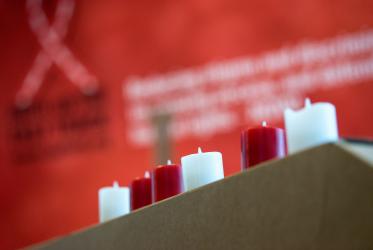“She is HIV positive too. No need to inherit her late husband’s title deed. She will die soon and leave it anyway.”
These man’s thoughts during his brother’s funeral were used by Jane Ng’ang’a, national coordinator, International Network of Religious Leaders Living with or Personally Affected by HIV (INERELA+) Kenya Chapter, to push the debate on property and inheritance rights linked to HIV. The discussion was held during the 61st Session of the United Nations Commission on the Status of Women (CSW), on 16 March, at the headquarters of UNAIDS, in New York.
The panel was co-organized by the World Council of Churches Ecumenical Advocacy Alliance (WCC-EAA), Greek Orthodox Archdiocese of America, UNAIDS, Salesians of Don Bosco, and the Permanent Mission of the Holy See to the United Nations.
Ng’ang’a spoke about her research on property and inheritance rights, sharing some true stories on how violations of property and inheritance rights are linked to HIV, hoping to encourage advocacy for religious leaders and faith-based organizations (FBOs) on such issues.
In some places in the world, women are prevented from holding jobs or from inheriting properties. When husbands or parents die, women are often impeded from inheriting or owning property. And women living with HIV are in an even more precarious situation - along with their children.
Even if under the law it is possible for women, theoretically, to control property, the property to which they would be entitled is often confiscated by the family members of the husband or by the male family members of the widow herself.
For Archbishop Bernardito Auza, permanent representative of the Holy See Mission to the UN, this is not only a problem of law, but “it is a problem of how women have access to the fiduciary structure,” he said.
“Therefore, defending the dignity of women involves then upholding and legally securing the right to own and inherit property through reforming laws wherever it is needed and making them practical and effective on the ground,” stated Auza.
Sheila Dinotshe Tlou, director of the UNAIDS Regional Support Team for Eastern and Southern Africa, was also part of the panel. She believes that FBOs themselves are already acting as champions in rights education.
“Half the time we have very good laws, but people don’t know these laws,” said Tlou. “We are all called to be champions, to really look at our communities and ask what are the issues that we can take to any world leader, whether it is a president or a minister,” she said.
Rev. Pauline Njiru, regional coordinator for Eastern Africa for the WCC’s Ecumenical HIV and AIDS Initiatives and Advocacy (EHAIA), shared some stories of women whose lives have been impacted by property and inheritance rights violations and the link between such violations and HIV. She stressed it is important “to raise awareness and overcome dispossession, and barriers to inheritance rights for women living with HIV.”
Rev. Thomas Brennan, from the Salesians of Don Bosco and moderator of the panel, hoped faith-based leaders “would now take up the charge to be able to educate people about HIV, women’s rights and look at the way that we can motivate our local communities to be able to do the changes that are necessary.”
“We need more champions. We need more people who say ‘I will make this my cause, because I believe that part of my faith is to reach out to those who are most marginalized,” he said.
“So we look to tell our communities that they have to help with the systemic change that is necessary to allow women to have all of their rights respected. And in instances where land is being taken away, that they not have that discrimination,” concluded Brennan.
Dr Isabel Phiri, WCC deputy general secretary, closed the panel affirming that “in terms of methodology, education is key. Education at all levels, for men, women, children, lawmakers and for the society in general, so they have a clear understanding of what is at stake when it comes to women’s issues”, she said.
In 2015 that there are still an estimated 17.8 million women living with HIV (15 or older), according to UN Women. As 51% of the global number of the adults living with HIV, women have been particularly affected by HIV and AIDS, and often do not receive the same level of attention as other demographics.
In many parts of the world, women living with HIV are often excluded from holding a job, inheriting and controlling property, and otherwise exercising economic independence, factors contributing to the true economic empowerment of women which subsequently has positive effects on development outcomes.
Watch the video streaming of the panel
Help Speed Up the Response to HIV








